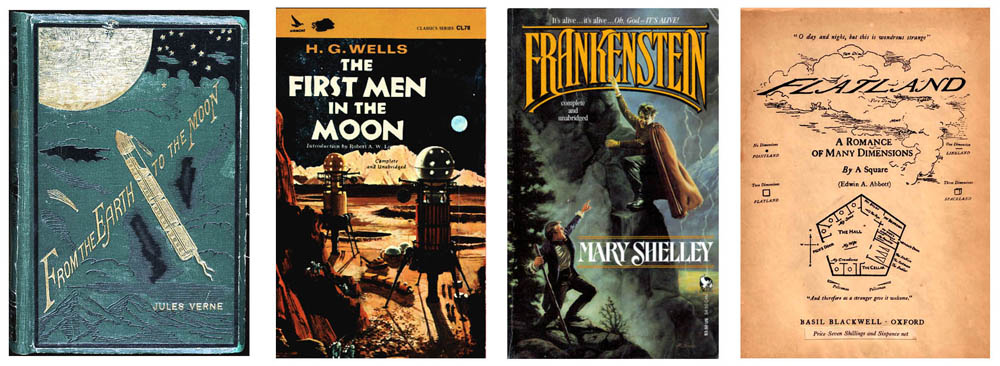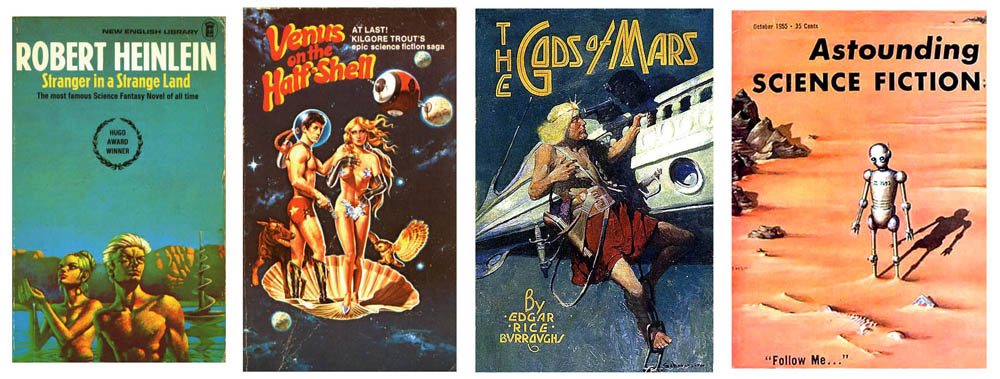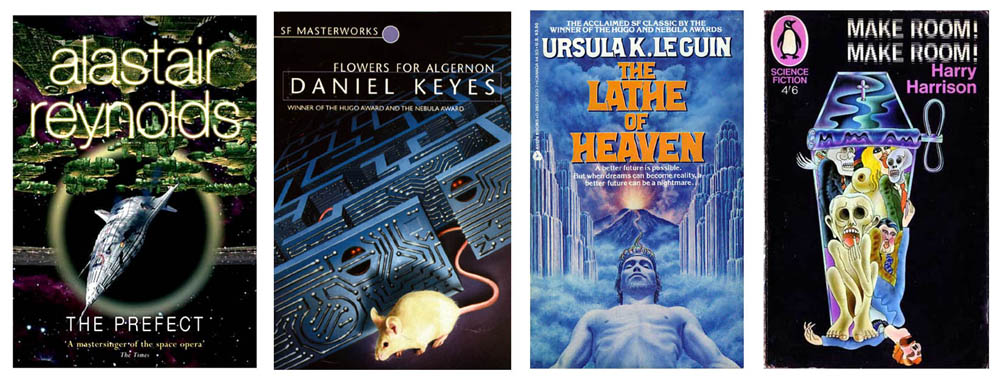|
"...And I Don't Even Like Science Fiction" |
|
Science fiction has a
serious image problem, and has
had for a long time. It isn't that
people don't like it, sci-fi films like
Star Wars and Jurassic Park have
been among the highest grossing
of all time, but a lot of people see it
as "non-adult" and essentially trivial
and refuse to take it seriously. I
must declare an interest, I wrote a
novel about artificial intelligence
called SIRAT that came out in the
year 2000, and the heading to one
of the first reviews it received on
Amazon was "... And I don't even
like science fiction". The gist of the
piece was that this woman had
read the book, presumably
unaware of its genre, and liked it in
spite of her anti-sci-fi leanings. All
credit to her for rising above her
prejudice, but this is a pretty big
barrier for a writer to overcome.
Historical Dimension
Science fiction has an honourable
pedigree, which some writers have
tried to push back to Classical
times (e.g. the flight of Icarus), but
the label only became attached to
the genre in late Victorian times,
when people began to get excited
about what science and technology
might be able to achieve. The
Victorians reasoned thus: We have
trains that can carry us around at
ten times the speed of a horse,
ships that need no sails, balloons
that can carry us thousands of feet
into the air. Where might it all
end? Could we have a vehicle that
would carry us to the moon (Jules
Verne From the Earth to the Moon)
or a machine that would allow us
to travel backwards and forwards
in time (H.G. Wells The Time
Machine), or might we even be
able to create an artificial human
being (Mary Shelley
Frankenstein)? Might there not be
intelligent beings on other planets
whose science is far superior to
ours (H.G. Wells The War of the
Worlds)? 
As the achievements of science
became ever more spectacular
so did the speculations of science
fiction writers. Everyone
could see how radically such technologies
as electricity, radio, heavier-
than-air flight, the internal combustion
engine and scientific medicine
had transformed human life
and human society. It was but a
small step to imagine the social
changes that the next scientific
revolution might engender. What if
a technology came along that
allowed us to live forever, or to spy
on one another with hidden cameras,
or set up colonies on other
planets, or control people's
thoughts, or create artificial
brains? The speculations of the
science fiction writers expanded
with the ambitions of science itself.
Space Fiction
I suppose a lot of people believe
that science fiction means space
ships, ray guns and meetings with
monsters on alien planets. The
cinema feeds this perception, with
films like the Star Wars series, the
Alien series, Starship Troopers,
War of the Worlds and the embarrassingly
similar Independence
Day; TV feeds it even more, with
such offerings as Star Trek, Dr
Who, Planet of the Apes, Lost in
Space, Blake's Seven, Battlestar
Galactica and many similar series.
Often there is cross-over between
the two, so that the Star Trek TV
series spawns the Star Trek feature
films, and the 1970s Planet of
the Apes feature films spawn successive
waves of Planet of the
Apes TV serials, leading in turn to
yet more Planet of the Apes feature
films. In reality all this is very,
very old-fashioned science fiction.
War of the Worlds was written in
1898 (!) and Star Wars is based on
the Flash Gordon and Buck
Rogers comic strips, first published
in the years between the
wars and continuing through World
War Two. It is, to a large extent, a
series of WW2 fighter-plane dogfights
transposed into a special
effects "space" setting. The golden
era of space fiction was between
the end of WW2 and about 1965,
when Charles Chilton wrote the
Journey into Space radio series
and Nigel Kneale the Quatermass
TV series. In the book world, Isaac
Asimov was writing his Galactic
Empire series, E.E. (Doc) Smith
his Lensman series, Robert
Heinlein his early space operas
like Starship Troopers (1959
source for the 1998 Paul
Verhoeven film!) and the Space
Cadet Ballantine series, and
Scientology founder L. Ron
Hubbard such rightfully forgotten
works as Forbidden Voyage, The
Emperor of the Universe and The
Conquest of Space. 
Retro Space Fiction
Yet there were, and are, people
still doing it: most notably Larry
Niven with his Ringworld series
(lampooned by Terry Pratchett in
his Discworld series) and Alastair
Reynolds, a Welsh physicist of
barely thirty summers, whose latest
offering The Prefect (May
2007) even sports a spaceship-adorned
cover that seems to harp
back to the days when the adventures
of Dan Dare were on Radio
Luxembourg and the latest edition
of Astounding Science Fiction had
just dropped through the letterbox.
Why would anybody want to write
this kind of thing in the 21st century?
Why would anybody want to
read it?
Other Kinds of Science Fiction
So where did science fiction itself
go? The answer is, all over the
place. The same authors like
Asimov and Heinlein, Arthur C
Clarke and Clifford Simak, who
had tried their hand at the ray gun
stuff in the Dan Dare years, started
speculating about immortality, free
will, telepathy, multi-world-line universes,
adjacent dimensions, different
kinds of reality, intelligent
robots, environmental catastrophe,
afterlife through the freezing of
dead bodies, races of genetically-engineered
super-humans and
human/machine hybrids. They
also introduced into their writing
philosophical speculations up to
and including the nature of the
Universe and of various imagined
versions of its Creator. Post-nuclear
wastelands and other
dystopias here on earth replaced
the acid seas and man-eating
fungi on distant planets. Each new
technology, such as the computer,
genetic engineering or virtual reality,
was pushed to its logical conclusion
and a bit beyond to see
where it might possibly take us if
we let it run forward unchecked.
Social issues like attitudes to
women (The Stepford Wives),
over-population (Make Room!
Make Room! and its screen adaptation
Soylent Green) and the possibility
that artificial intelligence
might supersede our own
(Asimov's Multivac stories, the
Terminator series, HAL in 2001,
Supertoys Last All Summer Long
and its screen adaptation AI, and
my own humble SIRAT) were all
explored. But still the stigma of the
Dan Dare years persisted, and a
convention was adopted that any
work that was good in the literary
sense would no longer be called
science fiction (1984, Brave New
World, Flowers for Algernon,
Metamorphosis, Naked Lunch,
Solaris, The Midwich Cuckoos,
Slaughterhouse Five).

Cyber Punk
In the 1980s and 90s a new sub-genre
emerged, written mainly by
the computer-game generation
and usually set in a future dystopia
in which computers and people
had reached some new level of
integration. It was usually peopled
by the violent and alienated young
who swore a lot, took drugs which
might totally change their view of
reality, filled their lives with loud
music and communicated with one
another in an invented slang of
their own. This was cyber-punk.
Anthony Burgess anticipated most
of its elements in his 1961 A
Clockwork Orange, but it had to
wait for the IT revolution and the
Internet to attain its full potential. A
recent mainstream spill-over from
this genre was the Matrix series of
films, within which space was
found for a bit of Kung Fu and a
few lively car chases for good
measure, and the similar but significantly
different Equilibrium.
Can We Sum It All Up?
With the proliferation of sub-genres
and the emergence of more
experimental kinds of writing it is
no longer at all clear what is and
isn't science fiction, whether in
books or on film. Perhaps it doesn't
matter, but if the term is to be
used as a way of dismissing work
as valueless without examining it,
then it matters at least to writers.
The Very Best Kind
Science fiction, in my opinion, is at
its best when it reveals a way of
seeing things that I was never
aware of before. I could say precisely
the same of the formal study
of philosophy, and, at least for me,
the difference between the two is
mainly one of presentation. An outstanding
example of science fiction
as philosophical exploration
would be Stanislaw Lem's Solaris,
in which the inhabitants of a space
station investigating the seemingly
sentient ocean that covers an alien
planet come under reciprocal
investigation themselves from the
planetary-sized organism. The
ocean tries, in a faltering but
benign way, to give them what they
want. The question at the heart of
the story is: Can human beings
ever be given what they want?
What is the fundamental aim and
fulfillment of human existence?
Tarkovsky's 1972 film is about a
tenth as good as the book itself,
Stephen Soderberg's 2002 adaptation
about a fiftieth as good, but
that makes both of them excellent
films. |











